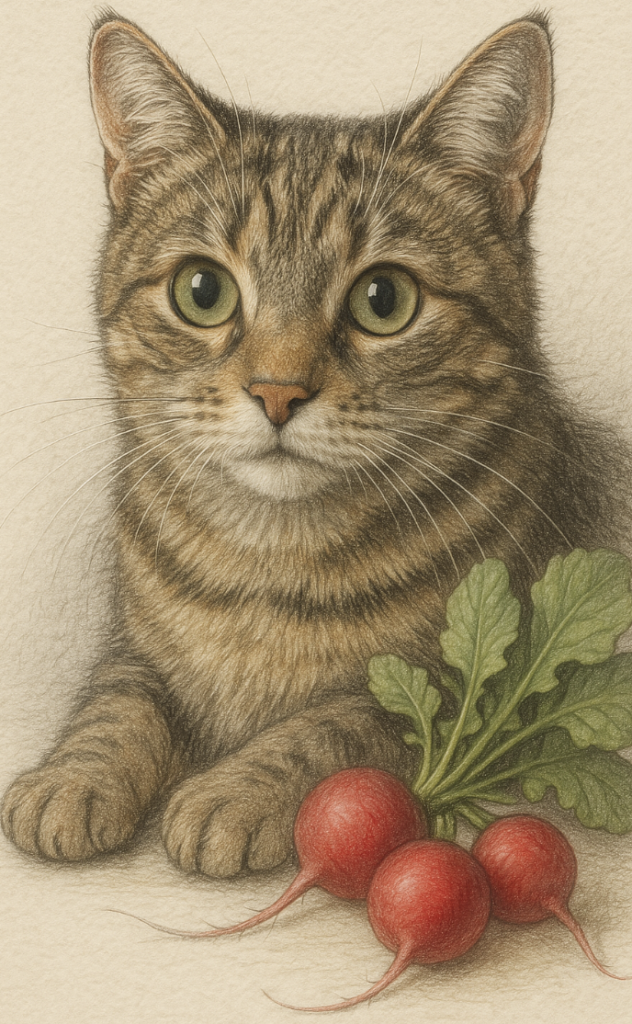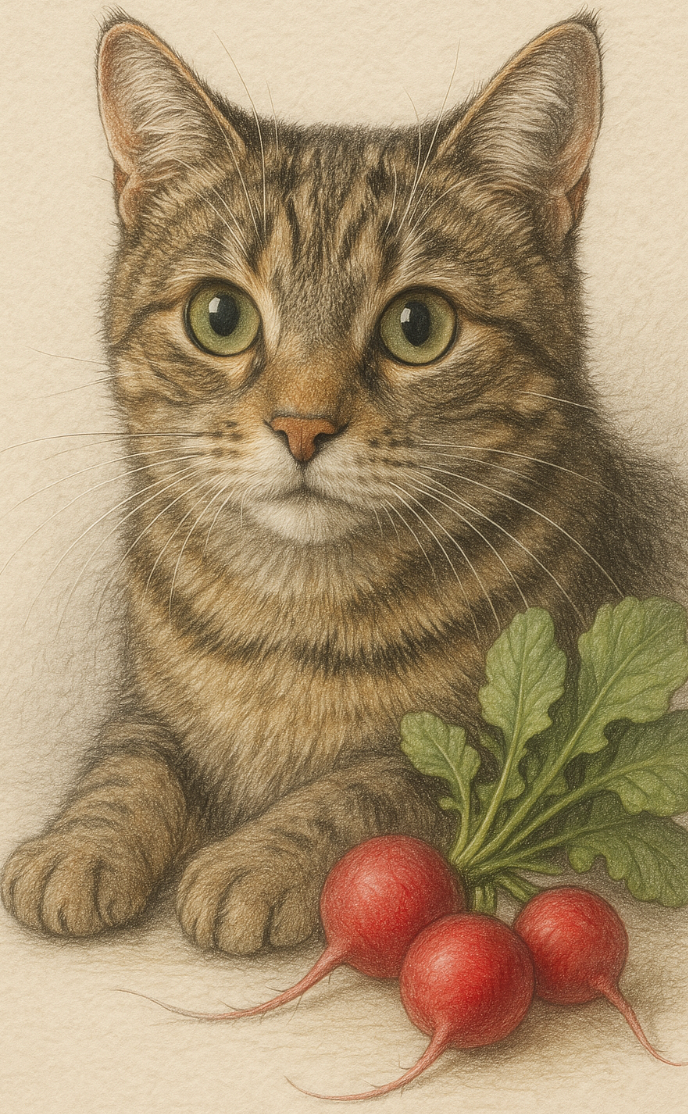Can Cats Eat Radishes?
Cats are naturally curious creatures, and their inquisitive nature often leads them to explore the world through taste. If you’ve ever caught your feline friend eyeing your salad or nibbling on vegetables like radishes, you might wonder whether these crunchy root vegetables are safe for them to eat. While cats are obligate carnivores, meaning their primary diet should consist of meat, they may occasionally show interest in plant-based foods. But can cats eat radishes without any risks? In this blog post, we’ll dive into the details, exploring the potential benefits, risks, and guidelines for feeding radishes to your cat. By the end, you’ll have a clear understanding of how to handle this situation safely and responsibly.
Potential Risks of Feeding Radishes to Cats
While radishes are not toxic to cats, they do come with certain risks that every pet owner should be aware of before offering them as a snack. Here’s what you need to know about the potential downsides.
Digestive Upset:
Radishes contain fiber, which can upset a cat’s sensitive digestive system, leading to vomiting or diarrhea if consumed in large amounts.High Water Content:
The high water content in radishes may cause bloating or discomfort in cats, who are not accustomed to consuming watery foods.Spicy Flavor:
Radishes have a peppery taste that many cats find unappealing. Forcing them to eat something they dislike can create negative associations with food.Choking Hazard:
Large pieces of radish can pose a choking risk, especially for smaller cats or those prone to gulping food.Nutritional Imbalance:
Cats require a diet rich in animal protein and fat. Feeding them too many vegetables, including radishes, can disrupt their nutritional balance.
These risks highlight the importance of moderation and careful preparation when introducing radishes to your cat’s diet.
Benefits of Radishes for Cats (When Offered in Moderation)
Although radishes are not a dietary necessity for cats, they do offer some minor benefits when given sparingly. These perks make them an occasional treat rather than a staple food.
Low Calorie Snack:
Radishes are low in calories, making them a guilt-free option for cats needing weight management.Hydration Boost:
The high water content in radishes can help keep your cat hydrated, especially during hot weather.Natural Antioxidants:
Radishes contain antioxidants like vitamin C, which support overall health and immune function in small doses.Dental Health Stimulation:
Chewing on small, soft pieces of radish may help reduce plaque buildup and promote dental hygiene.Variety in Diet:
Offering a tiny piece of radish as an occasional treat can add variety to your cat’s otherwise meat-focused diet.
While these benefits exist, they should not replace your cat’s primary nutrition but rather complement it in moderation.
Check this guide 👉Can Cats Eat Flour? Best 7 Expert Tips!
Check this guide 👉Can Cats Eat Poppy Seeds? Best 7 Expert Tips!
Check this guide 👉Can Cats Eat Pomegranate? Best 7 Expert Tips!

Safe Alternatives to Radishes | Risks of Unsafe Vegetable Choices |
|---|---|
Cooked carrots (plain, no seasoning) | Onions and garlic (toxic to cats) |
Steamed green beans | Raw potatoes (contain solanine) |
Pumpkin puree | Avocado (high in fat, toxic in large amounts) |
Plain cucumber slices | Mushrooms (wild varieties can be toxic) |
Small amounts of plain lettuce | Spicy peppers (can irritate stomachs) |
How to Safely Introduce Radishes to Your Cat
If you decide to let your cat try radishes, it’s essential to follow specific guidelines to ensure their safety and comfort. Here’s how to introduce radishes responsibly.
Start with Tiny Portions:
Offer a pea-sized piece of radish to gauge your cat’s reaction and avoid overwhelming their system.Remove Leaves and Stems:
The leaves of radishes can be tough and difficult to digest, so always serve only the root portion.Serve Plain and Unseasoned:
Avoid adding salt, spices, or dressings, as these can harm your cat’s sensitive digestive tract.Monitor for Adverse Reactions:
Watch for signs of digestive upset, such as vomiting, diarrhea, or lethargy, after offering radishes.Consult Your Veterinarian:
Before introducing new foods, seek advice from your vet to ensure they align with your cat’s unique dietary needs.
By following these steps, you can minimize risks and ensure a safe experience for your cat.
Signs Your Cat May Not Tolerate Radishes
Even with precautions, some cats may not tolerate radishes well. Recognizing early warning signs allows you to act quickly and prevent complications.
Vomiting or Diarrhea:
These symptoms indicate that your cat’s digestive system is struggling to process the radish.Loss of Appetite:
If your cat refuses to eat after trying radishes, it could signal gastrointestinal discomfort.Excessive Drooling:
Drooling may occur if your cat finds the taste unpleasant or experiences oral irritation.Lethargy or Weakness:
A sudden lack of energy could suggest an adverse reaction to the radish.Pawing at the Mouth:
This behavior often indicates irritation or discomfort caused by the radish’s spicy flavor.
Being vigilant about these signs ensures your cat stays healthy and happy.
Common Mistakes to Avoid When Feeding Radishes to Cats
Feeding radishes to your cat requires caution to avoid mistakes that could harm their health. Here are some pitfalls to watch out for.
Offering Large Portions:
Giving too much radish at once can overwhelm your cat’s digestive system and lead to discomfort.Including Seasonings or Dressings:
Salt, spices, or oils can irritate your cat’s stomach and should always be avoided.Ignoring Allergic Reactions:
Some cats may have sensitivities to radishes; failing to notice allergic signs can worsen the issue.Forcing Them to Eat:
Never force your cat to eat something they dislike, as this can create negative associations with mealtime.Neglecting Veterinary Advice:
Skipping a professional opinion can result in unknowingly harming your cat with inappropriate food choices.
Avoiding these mistakes ensures a safer and healthier experience for your cat.
Alternatives That Provide Similar Benefits to Radishes
If you’re hesitant about feeding radishes, there are plenty of alternatives that offer similar hydration and nutritional benefits without the risks.
Plain Cucumber Slices:
Cucumbers are hydrating and mild in flavor, making them a safer option for most cats.Cooked Carrots:
Soft, cooked carrots provide vitamins and fiber in a form that’s easier for cats to digest.Pumpkin Puree:
Plain pumpkin aids digestion and helps regulate bowel movements without irritating the stomach.Steamed Green Beans:
Low in calories and packed with nutrients, green beans are a great occasional treat for cats.Fresh Lettuce:
Small amounts of plain lettuce can add variety to your cat’s diet without causing harm.
These alternatives allow you to cater to your cat’s curiosity while keeping them safe.
Understanding Your Cat’s Natural Instincts Around Vegetables
Cats are obligate carnivores, but their natural instincts sometimes lead them to investigate plant-based foods. Understanding their behavior helps explain their fascination.
Curiosity and Exploration:
Cats use their senses to explore new textures and flavors, even if they don’t typically consume plants.Occasional Grazing Behavior:
Some cats nibble on grass or vegetables to aid digestion or induce vomiting to clear hairballs.Mimicking Human Habits:
Cats often mimic their owners’ actions, including showing interest in human food like salads.Seeking Variety:
Even though cats rely on meat, they may crave novelty in their diet, leading them to try new foods.Self-Medicating Instincts:
In rare cases, cats may consume plants to address minor discomforts or imbalances in their bodies.
By recognizing these behaviors, you can better address your cat’s needs in a safe and controlled manner.
Frequently Asked Questions About Cats and Radishes
Are radishes toxic to cats?
No, radishes are not toxic, but they should be given in moderation due to their high fiber and water content.
Can kittens eat radishes?
Kittens have more sensitive digestive systems, so it’s best to avoid giving them radishes altogether.
What vegetables are safe for cats?
Safe options include plain pumpkin, cooked carrots, and steamed green beans in small amounts.
How much radish can I give my cat?
Limit radish portions to a pea-sized piece once or twice a month to avoid digestive issues.
What should I do if my cat eats too many radishes?
Monitor your cat closely for symptoms of distress and contact your veterinarian if problems arise.
Prioritizing Your Cat’s Health When It Comes to Radishes
While radishes are not inherently harmful to cats, they should never become a regular part of their diet. As obligate carnivores, cats thrive on a diet rich in animal protein and fat, with minimal reliance on plant-based foods. By understanding the potential risks and benefits of feeding radishes, you can make smarter choices about your cat’s nutrition. Always prioritize moderation, supervision, and veterinary guidance to ensure your feline friend remains healthy and happy. Remember, a curious cat doesn’t always know what’s best for them—it’s up to you to provide safe and nutritious options.
Do Cats Have Taste Buds? Best 7 Expert Tips! – Discover how cats experience flavors and why their taste is so unique.
Do Dogs Have Taste Buds? Best 7 Expert Tips! – Discover how dogs experience taste, their preferences, and what it means for their diet and health.
Can Cats Taste Sweet? Best 7 Expert Tips! – Discover why cats can’t taste sweetness, how it affects their diet, and tips to keep them healthy and happy.
Can Dogs Taste Sweet? Best 7 Expert Tips! – Discover how dogs perceive sweetness, which foods are safe, and tips to manage their sweet cravings responsibly.





